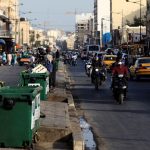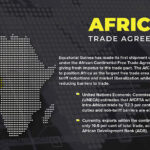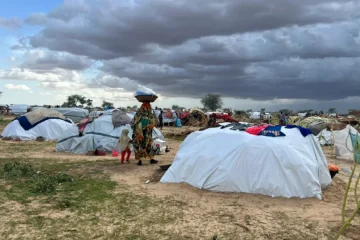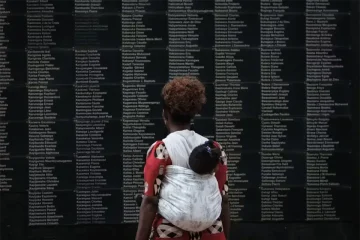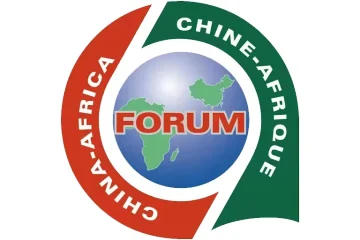MATHEWS PHOSA
OPPORTUNITIES for growth and development will always present themselves naturally, but economic dynamism is critical. As such, the key to real economic dynamism is about leveraging opportunities into real sustainable value. Value for our people, our neighbours, our region and our Continent.
The real economic boons or revolutions have been based on converting opportunities into value. The Industrial Revolution was about effectively deploying vast amounts of capital for productive capacity to stimulate industry, goods and related services.
Converting opportunity, which is access to capital, into real sustainable value, is the backbone of sustainable infrastructures such as rail, seaports and airports, accounting for latter-day rapid infrastructure development of global nations.
Real sustainable value is underpinned by the information revolution which we are currently experiencing. It is also about the opportunities to use information as a sustainable value tool. The leverage is based on access to information.
Information is power and information retains financial and capital markets. If Information creates knowledge, then it should create new economies, new products and services and above all it should wave-in a paradigm shift in terms in the realm of possibilities.
The information revolution opportunities have been leveraged to create real sustainable value in terms of infrastructure relating to the internet of things, fibre, telecommunications networks, mega-satellite networks, space travel, new financial systems and currencies, innovative banking solutions, autonomous driving vehicles – and many many others. It is impossible to exhaust this list of opportunities, but I hope I have made my point.
This value will continue to spur the next wave of economic growth for Africa, creating new economies with the dawn of the African Continental Free Trade Area (AfCFTA) for free flowing economies. This is real value.
We need to take into consideration the following principles:
- AfCFTA dependent upon the effective functioning of transport corridors to support trade
- Investment in infrastructure alone does not guarantee increased regional growth and development – there has to be a coordinate approach of political will, infrastructure development, operational efficiencies, enabling policies and processes for cross border and transit trade, as well as the much needed structures to ensure collaboration and communication with all role-players and users of regional corridors.
- Effective functioning transport corridors ought to have effective functioning multilateral, multi-stakeholder, public/private corridor management institutions”.
- Corridor management bodies are set up to promote and develop the various transit corridors across Africa through consultation and coordination, given the diversity of stakeholders and a large number of government agencies that oversee different activities within a corridor. It has indeed been realized that corridors with corridor institutions have usually been better equipped to address challenges than those without an institutional arrangement.
- Governments within SADC have lagged behind in implementation of measures to support border post efficiency.
- SADC performs most poorly of all the regional economic communities on the continent in regional integration which is as a result of the lack of political will of governments to adopt long term strategies for trade facilitation and revenue collection from customs revenues.
Decisions made in one country affecting trade will impact neighbouring countries, but the consequences of decisions are seldom considered, particularly where the impact on neighbouring country’s trade efficiency and transport is concerned.
- COVID-19 examples of unilateral implementation of testing regimes which have no relation to the neighbouring countries have resulted in literally billions of dollars being lost in the region due to delays.
- This impacts two of the poorest countries in the world, i.e. Zambia and Malawi, which are landlocked and listed as least developed countries. This region and the economies cannot afford this!
- Governments must start doing things differently. Einstein’s definition of insanity is relevant here, i.e, doing the same thing and expecting a different result.
- Key here is that corruption at border posts and particularly along road transport routes is keeping the region poor and is defeating efforts at economic growth.
- Trade facilitation measures that do not integrate the latest technologies with information sharing across platforms and agencies are obstructive.
- Mozambique’s efforts over the past seven years are to be commended with the implementation of the Single Electronic Window which is world best practice is trade facilitation technology and reducing the manual transactions to a minimum. Resistance to the implementation was unsurprising because of the reduction in opportunities for corruption, but this has paid enormous dividends for Mozambique
- While One Stop Border Posts have been the buzz word for the past two decades, experience on the North South Corridor have shown that these are limited in their ability to develop real efficiencies.
Now let’s start with the opportunities.
These are obvious. The entire world is converging on our continent to chart economic recovery for us all. The G7 leaders converged for an agenda for global action to – end the pandemic and prepare for the future – reinvigorate economies – secure our future prosperity – protect our planet – strengthen partnerships – and embrace our values.
It is important to note, that the G7 and the G20 partners with all relevant international organisations strive to secure a cleaner, greener, freer, fairer, and safer future for our people and plant. Africa will remain a centre-pod for the global economic recovery which, by and large, will be based on access to vast amounts of natural resources. We live, touch and rest with these resources! Albeit In abundance!
Cobalt, Copper, Titanium, Oil, Rare earths and many more are available for the next generation storage devices and energy generation solutions. However, we need new technologies and the creation of new economies and enterprises. We have the resources to feed the world. The resources to ensure a healthy lifestyle far from the genetically modified products contributing to global health crises.
We have the resources to build new enabling infrastructure such as ports, rail, space stations and satellites. We have the resources to build sustainable living spaces. We have the resources to create a futuristic world, of which the time for it has arrived. The time for new ideas, and for them to live in their time.
How do we create this value?
Creating, as a regional economy, enabling infrastructure to harness our resources is key, not only to trade our resources but to add value through beneficiation.
In effect a new spin on an old theme. Taking the Industrial Revolution within an African Context! To unpack this, I outline the following themes.
- The Regional economy: We have to collaborate and we must create regional corridor economies. It’s not about competition anymore. The paradigm shift is all about collaboration. Collaboration will harness our collective resources effectively as we are still a region of limited capital. Collaboration will also ensure an effective platform to pooled skills and institutional knowledge and create intellectual dynamism. We do have SADC policies, institutional frameworks and models. However these institutionalised policies and models will require new thought to ensure relevance within the context I have set out. I will leave that to the intellectuals and business leaders within this Forum to create.
- Enabling Infrastructure: We have invested extensively in enabling infrastructure within the region. We have created new sea ports, rail networks and Special Economic Zones. During my tenure as Premier of Mpumalanga I conceptualized, designed and implemented the Maputo Regional Economic Development Corridor. This Corridor resulted in an investment for enabling infrastructure such as the N4. However due to poor operations and maintenance support, this enabling infrastructure will require revitalisation. To this end, we require an Innovative Infrastructure Development and Funding Model and yes, Public Private Partnerships have resulted in port concessions but these PPP’s are at the coalface stifled by legislative framework in times when new ideas have to be recognized.
In earnest we do not have the luxury of time and I don’t know how to express this, but, we have to ensure first mover advantage. And the Infrastructure Funding Models will chart a way.
At the backdrop of this fund we also need to be cognizant of fiscal and monetary policy. We cannot burden our future generations with debt through international borrowings. I neither suppose we weaken our currency by merely printing money, but I propose trading our resources within the framework of a value creating scenario for the domestic economy first.
- Beneficiation is a multifaceted economic tool. To think of it, beneficiation of resources in value added products creates jobs. It creates new skills and new industries. It creates new economies within our region, and Beneficiation will ensure our resources are branded. Brands have embedded value. Beneficiation ensures improved livelihoods and social economic development in terms of an expanded middle class. Beneficiation also acts as a catalyst for related products and services. The value of beneficiation is that it acts as a hedge against risks. Risks relating to economic downturns. Funding and investment risks. Inflation risks and currency risks. It is a hedge against most possible risks if done in a sustainable and structured model.
In addition to the regional economy, we should consider regional and economic passports. In the case of South Africa and Mozambique it will not only ensure that people can-post the virus pandemic- move more freely. In addition the creation of such economic passports for the businesses will ensure freer and faster movement of goods across our borders. It will also ensure that tiresome and often corrupt practices at points of regulation are streamlined and those that serve no purpose done away with.
Furthermore, we need to identify those key economic drivers that hold the highest potential of economic growth and remove all but the most necessary regulation from them. In addition, redesign stimulatory packages so that companies on both sides of the border can benefit and accelerate their influence on regional growth.
SADC LOGISTICS
Moreover, we must establish public private partnerships that have the singular aim of removing all impediments to the optimal movement of goods and services between the member countries. If I have learned one lesson from my previous life as a politician it is that politicians should manage politics and not businesses nor economies. The focus of politicians in initiatives such as corridor economies should be to create legal frameworks and institutions to liberate businesses, not restrain them. The state institutions that are either corrupt or bloated or stand in the way of a better life for all should either be cut to the bone or swiftly abandoned.
There is one additional theme that I would like to touch on. Leveraging technology to create value: As set out above, we are in the midst of the information revolution.
South Africa and the region have conceptualized our own revolution – the 4th Industrial Revolution. How do we leverage current and emerging technologies to create sustainable value?
Here is a thought, embed technology in every component of our economic value chain. Technology will allow us to operate efficiently in terms of our port operations.
Technology will ensure we are able to operate and manage our infrastructure effectively and efficiently. Utilize technology to enhance skills in terms of learning platforms and supply chain. Utilize technology to “rebalance the economy” from source to end markets. Utilize technology to create new ways of doing business.
Technology is our new way of doing business. The development and deployment of technology is critical to our revolution. We require greater partnerships with the private sector and institutions of research and higher learning. We require a paradigm shift in terms of applied sciences. We require possible changes in the current teaching curriculum. Technology is the future and the future is here right now.
- This is an edited version of Dr Mathews Phosa’s address at the “INFRASTRUCTURE: DEVELOPMENT OF SADC REGIONAL CORRIDORS” conference hosted by the Southern African Development Community.





